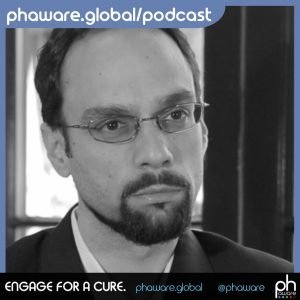Phaware Podcast: Demos G. Papamatheakis, MD
Written by |

This podcast series, created and produced by phaware, is being offered as a regular guest feature on Pulmonary Hypertension News to bring the voices and life experiences of PH patients, family members, caregivers, healthcare specialists, and others to our readers. You may listen to the podcast directly, or read it via the transcript that runs below.
I’m Aware That I’m Rare: Demos G. Papamatheakis, MD
The phaware™ interview
Demosthenes (Demos) Papamatheakis, MD is a board-certified pulmonologist and intensive care specialist from UC San Diego. Dr. Papamatheakis participates in multiple clinical trials looking at new medications geared toward pulmonary arterial hypertension treatment. As an assistant professor of medicine, Papamatheakis has a strong interest in medical education and is an active participant in training medical students, residents and fellows in pulmonology and critical care medicine.
I’m Demos Papamatheakis.
That’s short for Demosthenes. It’s a very, very Greek name. I grew up in Greece, did most of my schooling in Greece and then moved to the U.S.  around 2003. I did my internal medicine in Michigan and my fellowship at Loma Linda, which is up the street here in southern California. I’ve been at UCSD for four-and-a-half years or so, doing pulmonary hypertension and chronic thromboembolic pulmonary hypertension.
around 2003. I did my internal medicine in Michigan and my fellowship at Loma Linda, which is up the street here in southern California. I’ve been at UCSD for four-and-a-half years or so, doing pulmonary hypertension and chronic thromboembolic pulmonary hypertension.
UC San Diego is one of the leading places in the world as far as pulmonary hypertension. There’s a lot of expertise here. To put it very simply, chronic thromboembolic pulmonary hypertension is one of these not-very-common diseases, but nevertheless, probably more common than people expect and very much under-recognized. It has to do with getting blood clots, usually that start from the legs and migrate into the pulmonary vascular beds, so the vessels in the lungs where, instead of dissolving with time, they end up scarring down, creating blockages in these vessels.
The blockages cause increased resistance in the vessels there that cause problems in the right side of the heart, that’s supposed to pump blood against this increased resistance and can end up in right heart failure and death. It’s a very morbid disease.
The good news about it is that all of these clots don’t dissolve by themselves and can be dissolved by medicine. They can be removed by surgical procedure, which we do here quite a bit, called a pulmonary thromboendarterectomy, which is a pretty big procedure that lasts quite a few hours in the day, but it’s one that our center has a lot of experience now with. It’s one that can be life-saving. It removes the resistance, it removes the clots, relieves the right side of the heart and allows for right heart failure to resolve.
Being one of the centers in the world that we get a lot of referrals, most of our patients are like that, they’re not local. The process is quite lengthy. It usually starts with a referring doctor sending us a packet of information. The referring docs can be anywhere from the same state, the same country, or even different continents. Different people from our group will go through this packet of information, kind of try to test out whether this is a patient that we think surgery would be helpful for. Depending on our decision, we go ahead and invite them here for this. That process can actually take a few months just to get all the nitty-gritty of insurance, travel, and just get everything set up and scheduled for this person.
Eventually, once they get here, they end up staying for about a week before the surgery where they do quite a workup, quite a bit of testing. Once that testing is concluded and everyone’s in agreement that, yes, we should go ahead and proceed with the surgery, the surgery usually happens the week after. The people usually stay for about 10 to 12 days in the hospital, depending on how everything went and whether there were complications or not. Ideally, after that, things have improved significantly and they get to go back home.
We definitely have all stages and all kind of different disease spectrum patients that we see. Being one of the centers that has more experience in this, we also tend to be the center that gets a lot of the trickier and harder patients, later stage patients, patients that less experienced centers, with less experienced surgeons, would not be comfortable dealing with them. And also patients that have had the surgery before and require a second operation for either new clots or some other complication, but we also see patients that are much earlier in their disease state. They don’t have a lot of pulmonary hypertension, but have a lot of symptoms and also have a lot of blockages. By removing the blockages we can take care of the symptoms and avoid possible right heart failure or worsening symptoms in the future.
One of the problems, one of the things that we have to deal with here at UCSD, if you can call it a problem, is a lot of our patients leave and we don’t get to see them because they’ve come from the far reaches of the world. Having said that, most of the time the way that they leave the hospital compared to the way that they come to the hospital, is completely different. That’s extremely rewarding.
This is probably the main reason we do this and we deal with this disease, even though it’s very tricky situation. At the same time, the difference that we see with the surgery is just impressive. It’s incredible. All of our patients are, at least 95% of them are, extremely appreciative. That, in combination with the feeling that we did something important and impacted their life is just extremely rewarding.
EVERYBODY HAS A STORY. WHAT’S YOURS?
phaware wants to share your pulmonary hypertension story with their engaged global audience. Whether you are a patient, caregiver, or medical professional, they are enlisting PH community members from across the globe. Visit www.phaware.global/podcast to share your story and to be considered for a future episode. Learn more about pulmonary hypertension at www.phaware.global. #phaware #phawarepod

Note: Pulmonary Hypertension News is strictly a news and information website about the disease. It does not provide medical advice, diagnosis, or treatment. This content is not intended to be a substitute for professional medical advice, diagnosis, or treatment. Always seek the advice of your physician or other qualified health provider with any questions you may have regarding a medical condition. Never disregard professional medical advice or delay in seeking it because of something you have read on this website. The opinions expressed in this column are not those of Pulmonary Hypertension News or its parent company, Bionews Services, and are intended to spark discussion about issues pertaining to pulmonary hypertension.





Leave a comment
Fill in the required fields to post. Your email address will not be published.